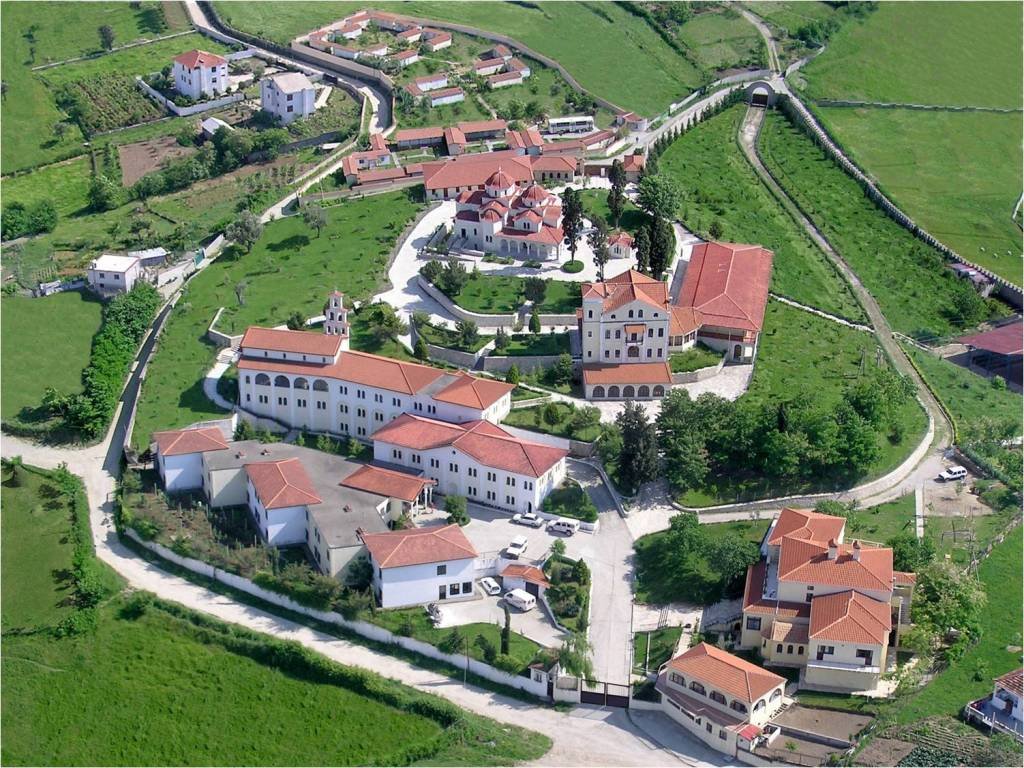History of the Academy
In 1940 in the Orthodox Church were more than 440 priests and deacons. In 1991 there were left only 22 of them, of whom three are still alive. In 7 February of 1992, Archbishop Anastasios opened a Theological Seminary in order to train young and faithful volunteers to learn the church services and to be prepared to serve in Orthodox Churches, by elevating them gradually to the clergy. The first class with 45 students began to take lessons at a beach hotel in Durrës, in difficult conditions, with lack of water, electricity and heat.
In 1996, the school relocated to new facilities in the village of St. Vlash, near Durrës. Archbishop Anastasios expanded the school’s focus from clergy-oriented seminary to a theological academy for both men and women. The first class of eight women entered the school in 1997. These women would serve in various church activities.
Location and Premises
The Theological Academy is located at St. Vlash Monastery near the city of Durrës. Built in 1996, the multifunctional complex is one of the most impressive and modern schools in Albania and includes a chapel, rich library with more than 15000 religious books, classrooms, computer room, media center, refectory, recreation center, and men’s dormitory. Women students are housed in quarters above St. George Church in Durrës. The Theological Academy has a rich library with more than 15.000 religious, scientific, historical, literary books.
The Goal of the Academy
The goal of the “Resurrection of Christ” Theological Academy is to provide spiritual and academic formation of the new Albanian clergy and laity through theological studies, liturgical life, practical field ministry, and community living.
Academic Life
All candidates accepted by the school are awarded scholarships from His Beatitude, Archbishop Anastasios. This annual scholarship covers all school expenses. Students must maintain an acceptable academic level and standard of personal conduct in order for the scholarship to be renewed each year. The four-year academic program includes courses in Old Testament, New Testament, Dogmatics, Patrology, Ethics, Liturgics, Church History, Philosophy, Canon Law, Preaching, Catechism, Pastoral Care, World Religions, Missiology, Albania Language, Ecumenical History, Byzantine Music, Field Education, Computers, and one foreign language (students choose English or Greek.)
Along with the academic program, students participate daily in the liturgical life of the school. This includes attendance at the daily service of Matins, Vespers, and Compline, as well as weekly spiritual discussions and periodic seminars.
At least once a week, students are involved in field education programs, including catechism in ten surrounding villages, and pastoral visits to the local institutions — two schools for handicapped children, and orphanage, a school for the blind, an old age home, and adolescent prison, and the hospital. In 1998, a group of initiators students, started to publish in the Academy premises the newspaper “Word-Fjala”. This newspaper contains information for various activities that take place in the Academy, writings of the students, translations, spiritual materials etc.. For recreational activities, the academy has a volleyball court, and an indoor game room.
Teaching Staff
The Resurrection of Christ Theological Academy operates under the oversight of the Holy Synod of the Orthodox Church of Albania, with His Beatitude, Archbishop Anastasios, serving as president. Sixteen theologically trained men and women from Albania, Greece, and the United States presently serve on the faculty. Along with these countries, over the past years, we have also had visiting faculty from Great Britain, Kenya, and South Africa.
Graduation
Until 2009 are graduated 201 students in this academy, 125 of whom have become clergymen and 38 others serving in various Church activities.
Future Development
Future plans include expanding the program of studies, with a vision to raise academic standards to the level of a state-accredited university institution. An important step towards this will be the development of an adequate library for serious academic and theological study and research. Additional classrooms, an auditorium, and a women’s dormitory are also in the plans.
Admission of the Students
The admission of the students at the Theological Academy is done through the admission competition (written and oral). The materials of the competition are based in four volumes “The Orthodox Faith” of Father Thomas Hopko, translated into Albanian by the Metropolitan of Korça, His Grace John. These volumes can be found in all the Orthodox Churches of Albania, as well as in the official web address of our Church www.orthodoxalbania.org/2020/.
Registrations for the competition take place in May to September.
The competition is given in the first week of September.
